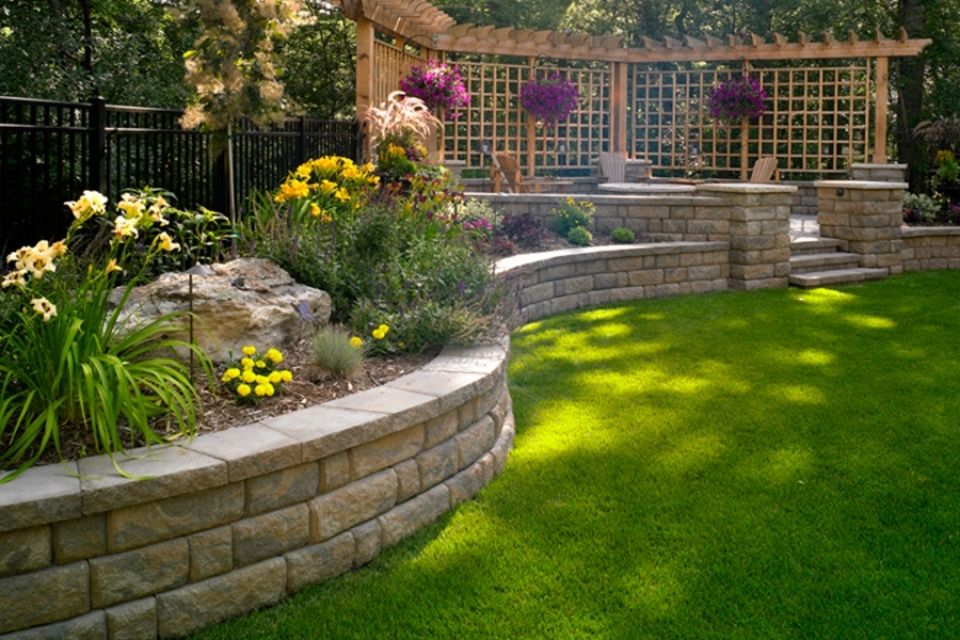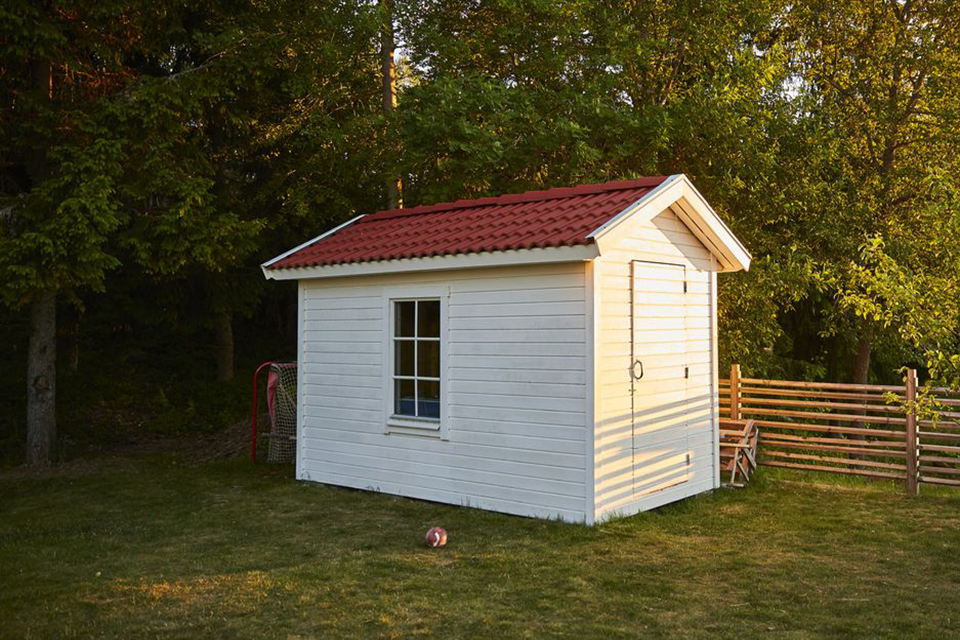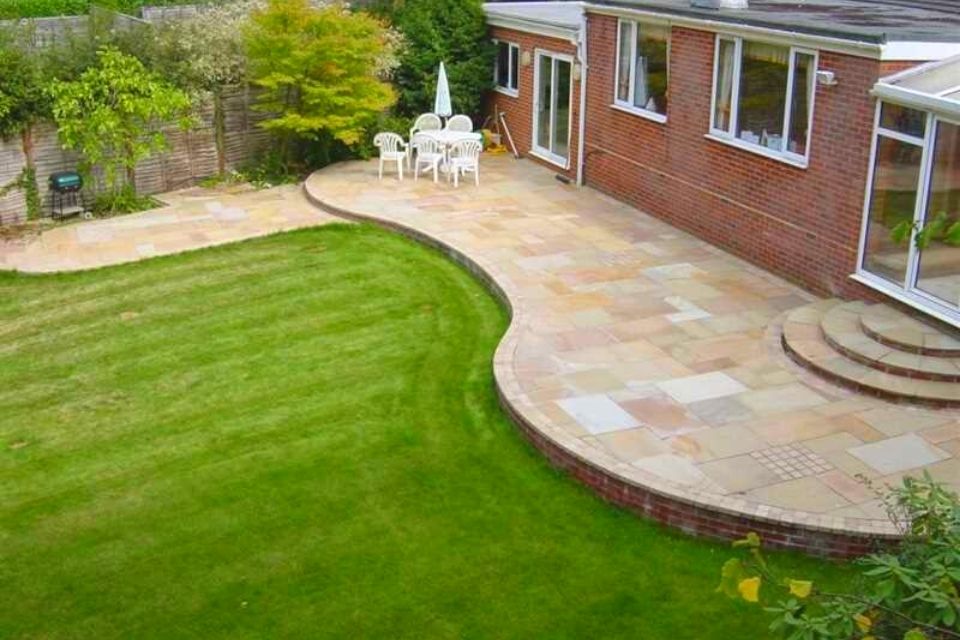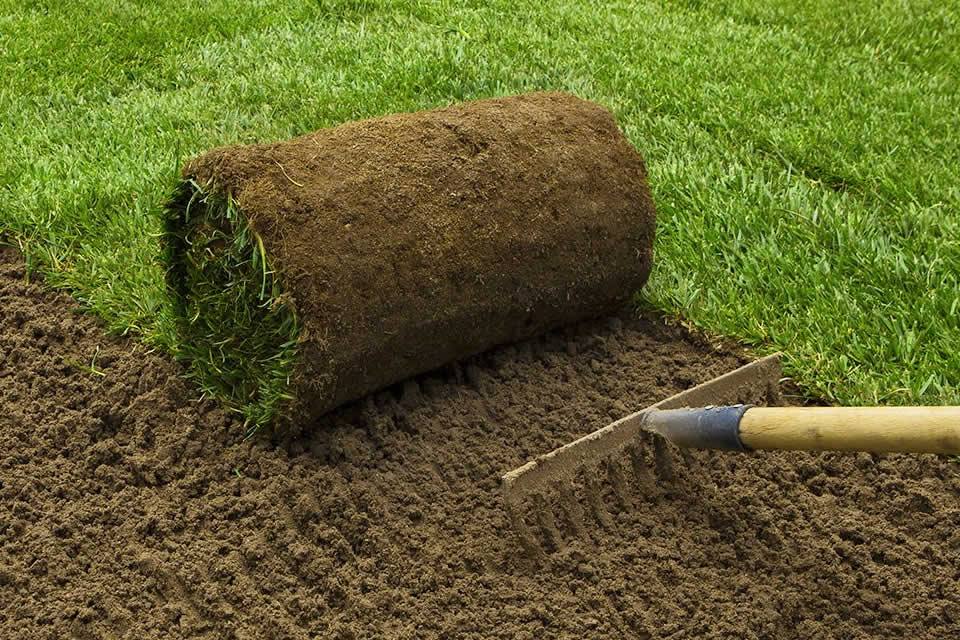How Much is a Brick Wall For Your Garden?
What can you expect from this guide?
This article will break down the supply and labour costs separately and look at additional, relevant topics including the time frames involved in building a garden wall and the cost of removing an old garden wall.
What is the average cost of building a wall?
The average cost of building a wall with conventional bricks would be £480 to £1,600 for a 1m high x 4m long wall, £750 to £2,900 for a 1m high x 8m long wall, and the cost of building a brick wall is £1,020 to £4,200 should it be 1m high x 12m long.
The price of a garden wall installation will vary depending on the materials used.
To build a garden wall with natural stone, it would cost approximately £240 to £520 for a 1m high x 4m long wall, £830 to £1,540 for a 1m high x 8m long wall, and you'd need a budget of around £1,140 to £2,160 for a 1m high x 12m long wall.
As for a concrete wall, prices would be about £440 to £640 for a 1m high x 4m long wall, £670 to £980 for a 1m high x 8m long wall, or £900 to £1,320 for a 1m high x 12m long wall.
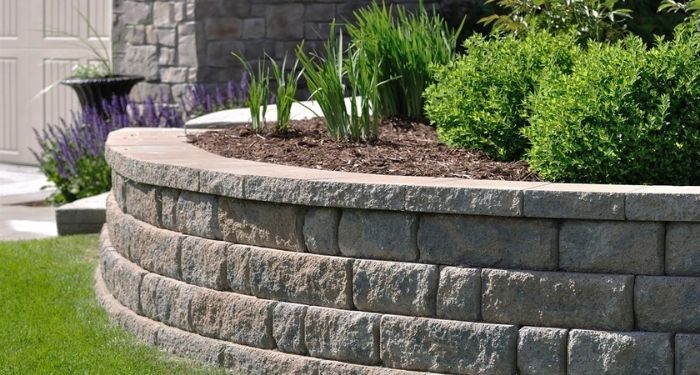
If you choose to have a wall constructed with flint, it would be about £680 to £880 for a 1m high x 4m long wall, £1,150 to £1,460 for a 1m high x 8m long wall, or £1,620 to £2,040 for a 1m high x 12m long wall.
To build one with sandstone would cost £560 to £920 for a 1m high x 4m long wall, £910 to £1,540 for a 1m high x 8m long wall, or £1,260 to £2,160 for a 1m high x 12m long wall.
A garden wall can provide additional privacy and safety to your property.
To have a wall made with facing bricks, it would cost roughly £480 to £720 for a 1m high x 4m long wall, £750 to £1,140 for a 1m high x 8m long wall, or £1,020 to £1,560 for a 1m high x 12m long wall.
Lastly, a wall made of slate would cost about £680 to £1,000 for a 1m high x 12m long wall, £1,150 to £1,700 for a 1m high x 8m long wall, or £1,620 to £2,400 for a 1m high x 12m long wall.
But what can change the overall costs of a garden wall?
Other cost factors include the thickness of the garden wall (i.e. single skin or double skin), number of tradespeople hired, ease of access, and the location of your property. Where you live is a notable cost-affecting factor given that the labour rate of hiring builders varies throughout the nation.
Labour costs in the London area tend to be higher than other parts of the UK.
For instance, in the southeast and London in particular, labour rates tend to be higher than the rest of the country, but the opposite is true in regions such as Scotland, Northern Ireland, and the north of England.
Garden Wall Prices 2024
| Material | Size of Wall | Total Cost |
|---|---|---|
| Conventional Bricks | 1m High x 4m Long | £480 to £1,600 |
| 1m High x 8m Long | £750 to £2,900 | |
| 1m High x 12m Long | £1,020 to £4,200 | |
| Natural Stone | 1m High x 4m Long | £240 to £520 |
| 1m High x 8m Long | £830 to £1,540 | |
| 1m High x 12m Long | £1,140 to £2,160 | |
| Concrete | 1m High x 4m Long | £440 to £640 |
| 1m High x 8m Long | £670 to £980 | |
| 1m High x 12m Long | £900 to £1,320 | |
| Flint | 1m High x 4m Long | £680 to £880 |
| 1m High x 8m Long | £1,150 to £1,460 | |
| 1m High x 12m Long | £1,620 to £2,040 | |
| Sandstone | 1m High x 4m Long | £560 to £920 |
| 1m High x 8m Long | £910 to £1,540 | |
| 1m High x 12m Long | £1,260 to £2,160 | |
| Facing Bricks | 1m High x 4m Long | £480 to £720 |
| 1m High x 8m Long | £750 to £1,140 | |
| 1m High x 12m Long | £1,020 to £1,560 | |
| Slate | 1m High x 4m Long | £680 to £1,000 |
| 1m High x 8m Long | £1,150 to £1,700 | |
| 1m High x 12m Long | £1,620 to £2,400 |
- How Much is a Brick Wall For Your Garden?
- What are the Supply Costs of Garden Wall Construction?
- What are the Additional Costs of Building a Garden Wall?
- Tradesmen Costs for Wall Construction
- How Long Does It Take to Build a Garden Wall?
- Choosing a Garden Wall
- Benefits of a Garden Wall
- How Much Does It Cost to Remove a Garden Wall?
- FAQs
- Sources
What are the Supply Costs of Garden Wall Construction?
We'll now look specifically at the material costs involved in building a garden wall. This excludes the price of hiring labourers, and thus this section is especially relevant to those considering undertaking this work as a DIY job.
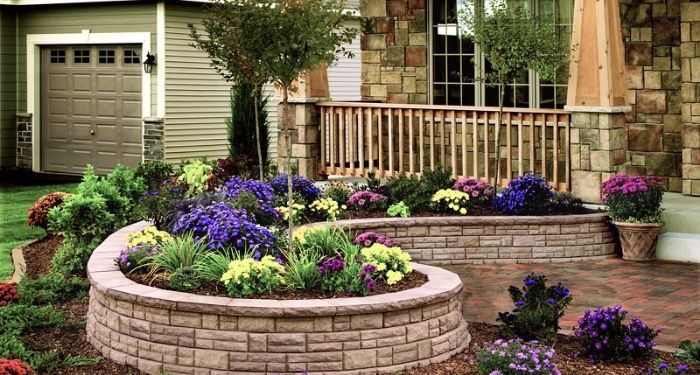
Please note that you should only build a garden wall yourself if you know exactly what is involved, have the appropriate skills and equipment, and know the necessary safety steps required.
The conventional brick wall cost is around £50 to £300 per m2. Expect to pay about £60 to £130 per m2 for a natural stone wall, £40 to £60 per m2 for a concrete wall, £100 to £120 per m2 for a flint wall, or £70 to £130 per m2 for a sandstone wall.
If you want to build a wall made of facing bricks, expect the material costs to be approximately £50 to £80 per m2 with the price rising to around £100 to £150 per m2 for one made of slate.
Of course, the cost of materials can vary depending on the number of wall skins being constructed and other factors such as in the case of bricks, the type of brick being used (e.g. machine-made, handmade and reclaimed).
Supply Garden Wall Cost:
| Type of Material | Supply Cost |
|---|---|
| Brick | £50 to £300 per m2 |
| Natural Stone | £60 to £130 per m2 |
| Concrete | £40 to £60 per m2 |
| Flint | £100 to £120 per m2 |
| Sandstone | £70 to £130 per m2 |
| Facing Brick | £50 to £80 per m2 |
| Slate | £100 to £150 per m2 |
What are the Additional Costs of Building a Garden Wall?
There are a variety of additional expenses you may face on top of the given garden wall prices. In this section, we'll consider some fairly common examples and discuss how they may add to your overall bill.
Minimum Fee
In some cases, labourers set a minimum fee. On the one hand, this may appear in the form of a cost that is added to your overall bill as a separate minimum charge. However, in some cases, it may apply as an extension of an existing charge.
So, say, for example, you are charged a daily labour fee. In this case, whether the job takes one day and three hours or one day and seven hours, you would be charged for two days of labour.
Charges for Excess Mileage
You may pay more to have a garden wall constructed if a labourer has a significant distance to travel to your home. What any given contractor will consider 'excess mileage' could vary a lot, but if they do classify a distance as such, they may charge you based on the fuel costs involved.
Why would you hire a contractor from out of town? Well, for one, you may be living in an isolated, rural spot or you may have a good recommendation from a friend/family member for a labourer from another city/region.
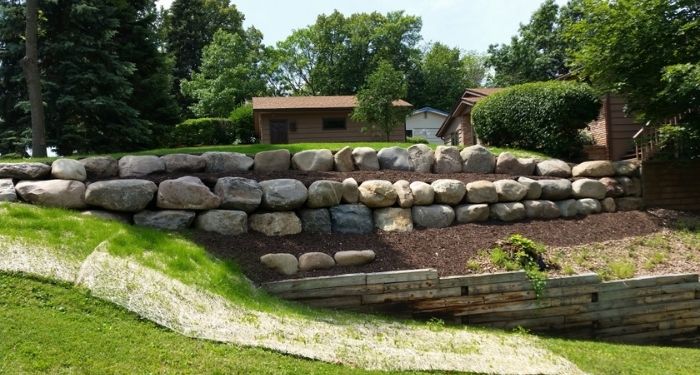
Should excess mileage charges apply, you'd be looking at paying about £0.41 per mile. Of course, this is a broad average, given that fuel costs depend on fuel and vehicle type.
However, using this average and considering that a contractor will need to travel to and from your home, the following calculation can apply to give you a sense of how much an excess mileage fee may come to:
0.41 x distance in miles x 2 = Excess mileage cost
For example, if you are located in and around Kielder Forest Park, a rural plantation in Northumberland, you would pay roughly £30 to £36 to cover the 40 miles between both regions (or 80 miles of total travelling to and from).
In other cases, labourers will set a given excess mileage fee regardless of the distances involved.
So, it could be 25 miles to your home or even 50 miles, and the charge in these cases would be the same. In other scenarios, a labourer may consider a distance too far to travel and outright refuse to take on the job.
It will simply depend on the labourer and the exact distances involved as well as other factors such as the time required (as some locations are quicker to get to with motorways for example).
If you'd like to get a rough idea of how much a labourer might charge in excess mileage fees to travel to your home and back from a given location, try using the Google Maps direction widget to figure out the distances involved and then plug said distance into the calculation given above.
Size/Type of Garden Wall
Of course, the larger the wall, the more materials will be needed and the longer it will take to build the wall. These factors would increase the supply and labour costs, respectively. The thickness of the wall is also an important cost-affecting factor.
Materials
When it comes to materials, costs can vary significantly. On the one hand, concrete costs about £40 to £55 per m2 but slate may cost between £100 and £150 per m2. Other materials such as natural stone and sandstone have price ranges in between these two options.
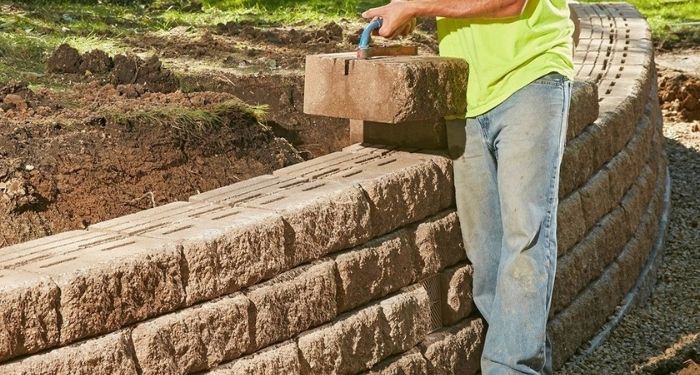
In addition, if you are using bricks, the type of brick is also important with machine-made bricks costing about £0.55 to £0.75 per brick, it costing roughly £0.80 to £1.50 per brick if they are handmade, or £0.75 to £2.50 per brick if you go with reclaimed bricks.
Number of Tradespeople
In most cases, two labourers will be hired to construct a garden wall. Of course, if three or more builders worked on the job, the labour cost would naturally be higher.
At the same time, the more labourers employed, the quicker the job will take. For that reason, it's hard to say whether increasing the number of tradespeople will cost more overall.
It would really depend on how well the labourers work as a team.
Duration
It goes without saying that the longer a job lasts, the higher the labour costs will be. However, this is not always true.
For example, if labour is charged per day, then you would be charged three days of labour whether the work took two days and three hours or two days and six hours.
The labour cost will not be tied to the duration at all if a set cost is given in advance.
Tradesmen Costs for Wall Construction
Here is what you can expect to pay for tradespeople rates.
Depending on the specific worker(s) you employ, a bricklayer would charge about £150 to £200 per day, but a general labourer may charge around £70 to £100 per day.
Given that two people will likely be on the job, you'd usually pay about £140 to £200 per day in total. Let's take a closer look at the labour costs involved for different garden wall types/sizes.
Once again, starting with single-skin walls, a 1m high x 4m long wall would feature a labour cost of about £210 to £300. You can expect to face a labour charge of roughly £280 to £400 for a 1m high x 8m long wall, or £350 to £500 for a 1m high x 12m long wall.
If you choose to have a wall built with two skins, the labour cost will be around £280 to £400 for a 1m high x 4m long wall, £350 to £500 for a 1m high x 8m long wall, or £420 to £600 for a 1m x 12m long wall.
The cost of hiring tradespeople will vary depending on the ease of access, the number of tradespeople hired, the state of the construction area, and where you live.
Labourers will charge more in say Maidstone or London in the southeast than in cities like Glasgow or Newcastle. Labour rates in Welsh regions tend to be relatively low as is also the case in Northern Ireland.
There are some exceptions to the rule. For instance, labourers generally charge rates similar to the southeast in the northern Durham town of Stockton-on-tees.
How Long Does It Take to Build a Garden Wall?
The timeframes for constructing a garden wall will vary depending on a range of different factors. In this section, we'll look at these factors and consider the duration for building different sizes and types of garden walls.
For a single skin garden wall, it will take about one to two days to build a 1m high x 4m long wall, two days to construct a 1m high x 8m long wall, or two to three days for a 1m high x 12m long wall.
To have a garden wall with two skins of thickness built would take about two days if it is 1m high x 4m long, two to three days if its 1m high x 8m long, or three days for a 1m high x 12m long wall.
Among the time-affecting factors are the number of labourers hired, ease of access, the state of the installation area, weather conditions, and the specific brick type chosen if bricks are being used.
Choosing a Garden Wall
We'll now explore the various garden wall materials and discuss each option's pros & cons and average costs.
Brick Wall Costs
A brick garden wall may consist of machine-made, handmade, or reclaimed bricks. In general, bricks are made from clay and usually shale, specifically.
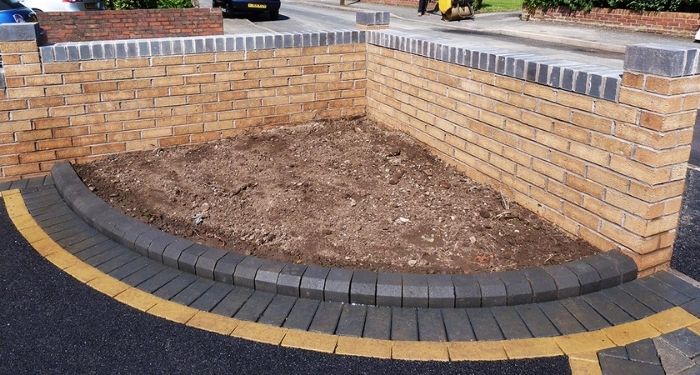
Shale is achieved by subjecting clay to extreme pressure before undergoing a process that turns them into brick units. Bricks are low-maintenance, eco-friendly, and resistant to fire and the weather.
However, they do not have great tensile strength and cleaning brick surfaces is a difficult job. Brick wall prices tend to be around £50 to £300 per m2.
Pros:
- Low-maintenance
- Eco-friendly
- Can be especially cheap (particularly if machine made)
- Resist the elements
Cons:
- Poor tensile strengths
- Difficult to clean
- Some bricks can be particularly dear
Natural Stone Wall Costs
Another popular choice for garden walls is natural stone. With an average cost of £60 to £130 per m2 natural stone is not necessarily costlier than brick, though it will be a little more expensive in most cases.
One of the key advantages of natural stone is its beauty, which by most people's account is far superior to the aesthetics of brick walls.
There is a wide range of colours and designs to choose from and is highly durable.
However, natural stone walls require sealant for protection, may take longer to construct than a brick wall of the same size, and generally are unsuitable for construction as a DIY project. Strong cleaning products could damage natural stone.
Pros:
- Unparalleled beauty
- A whole host of colours/designs available
- Extremely durable
Cons:
- Requires sealant
- May prove time-consuming to build
- Strong cleaning products can be damaging
Concrete Wall Costs
The versatility and cleanliness of concrete walls are some of their outstanding benefits. There is also a choice of three key types of concrete walls available, namely concrete block walls, precast concrete panel walls, and poured-in-place concrete walls.
It allows you to keep your options open with various methods, particularly if you are building a concrete garden wall on a DIY basis.
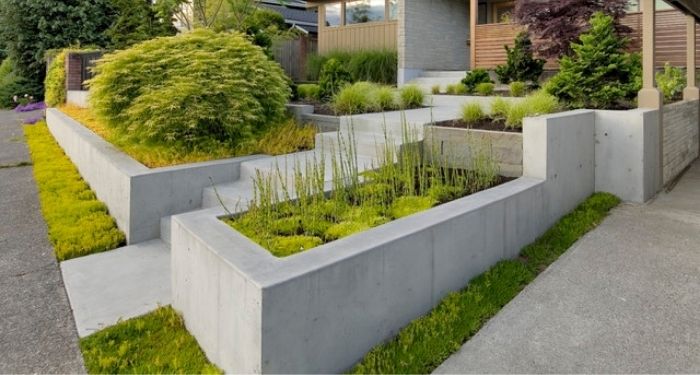
Beyond that, concrete walls tend to be strong, durable, easy to install, and low maintenance. You can also have a concrete wall constructed with a shade/tone of your choosing, and such walls can be built to look like alternative materials such as natural stone.
However, concrete walls may come with design challenges, depending on the state of the construction area and removing a concrete wall is not straightforward. The average cost of a concrete wall is £40 to £60 per m2, making it one of the cheapest options.
Pros:
- Affordable
- Durable
- Strong
- Easy to install
- Low maintenance
- Wide-range of options
Cons:
- Can come with design challenges
- May be difficult to remove
Flint Wall Costs
This material is extremely rigid and watertight. Flint comes in the form of fine-grained silica and has been used to build walls in England dating back to the Roman Empire. Nowadays, flint is not used for wall construction very often.
However, flint can be used to build walls with an eye-catching and beautiful appearance. On average, it costs £100 to £120 per m2 in supplies to build a flint wall.
Bonding pieces of flint together can be difficult due to its impervious properties. As a result, the elements may weaken the structure with time if poorly maintained. Insufficient repairs can be more detrimental to the soundness of a flint wall than with other materials too.
Pros:
- Very rigid
- Watertight
- esthetic value
- Not too expensive
Cons:
- Bonding flint pieces can be challenging
- Poor maintenance can lead to serious issues
- Improper repairs can also prove very problematic
Sandstone Wall Costs
Sandstone is an orange-peachy sedimentary rock, primarily made of quartz sand. Sandstone walls are reasonably durable, eco-friendly, easy to repair, and provide a natural aesthetic similar to flint and natural stone walls.
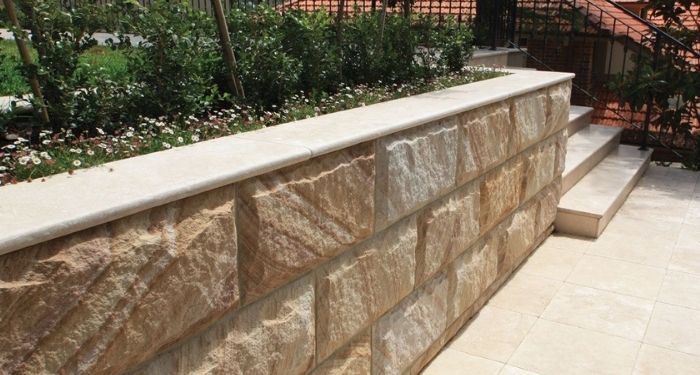
The average supply cost of a sandstone wall is £70 to £130 per m2. Sandstone is more porous than most options on this list. It is, therefore, more prone to weathering over time and not as long-lasting as flint.
With that said, most stone walls last for at least 150 years either way, so it shouldn't be an issue any time soon!
Pros:
- Eco-friendly
- Relatively easy to repair
- atural aesthetic
- Generally low-costing
Cons:
- Not watertight
- usceptible to weather damage
Facing Brick Wall Costs
Also known as exposed bricks, face bricks are an attractive and strong option that may slightly increase your property's value.
Face bricks walls may be time-consuming to build, however, and you'll need professionals to build this type of wall for you as generally speaking, a facing brick wall construction is not ideal as a DIY project.
The supply costs of a facing brick wall are roughly around £50 to £80 per m2. Along with concrete walls, facing brick walls are the most affordable option available.
Pros:
- Cheap garden wall bricks
- Aesthetics
- Strong
- May increase the worth of your home
Cons:
- Difficult to build
- Not generally suitable as a DIY project
Slate Wall Costs
If you decide to go with a slate wall, you will benefit from its watertight, dense, and thermally conductive/expansive properties. Unfortunately, slate is relatively brittle.
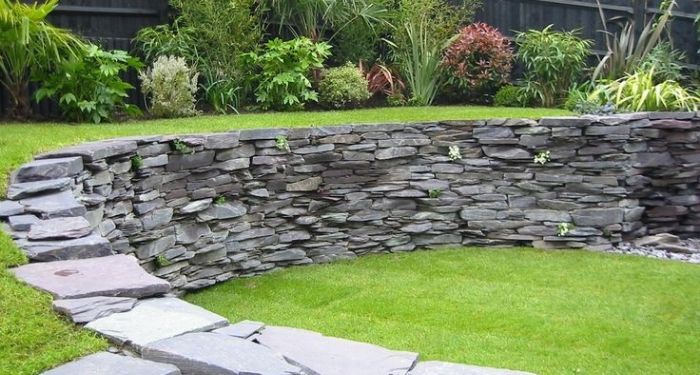
Its appearance is not for everyone as some may deem it too dull or/and chaotic for their liking. The jagged look of slate walls is not every homeowner's cup of tea either. On average, slate walls cost £100 to £150 per m2 in supply costs.
Pros:
- Watertight
- Dense
- Thermal conductivity and expansion
Cons:
- Brittle
- Not the right aesthetic for everyone
Benefits of a Garden Wall
Regardless of what type of garden wall you believe is best for you, there are advantages to having a garden wall constructed. Let's take a look at some of the top benefits of building a garden wall.
Privacy/Establishing a Barrier
If your garden has a fence or no barrier whatsoever, it can leave you feeling that your home does not have the sort of privacy you'd like.
It may also be disruptive visually and aesthetically unpleasing, say if out your back garden the first sight you get is of a busy road or a footpath.
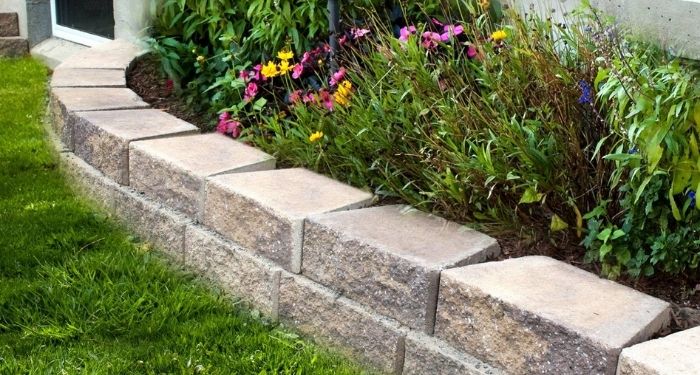
By having a garden wall built, you can close off your garden and create a better sense that your garden is a private space for you and your family.
Wind Control
If your garden is prone to blustery winds flowing through on a breezy day, a strong wall will help to better enclose the back of your property off from the wind.
As a result, it will make being in your garden on a windy day more comfortable and reduce the sound of the wind on your property and in your garden.
Soundproof
Garden walls can also improve sound insulation for your garden and inside your home. It will help deflect and minimise external sounds from outside your property, making your garden and home a quieter and more relaxing environment.
How Much Does It Cost to Remove a Garden Wall?
There are plenty of reasons why someone may want to have a garden wall knocked down. For one, they may be having it replaced with a new wall or a new barrier such as a fence.
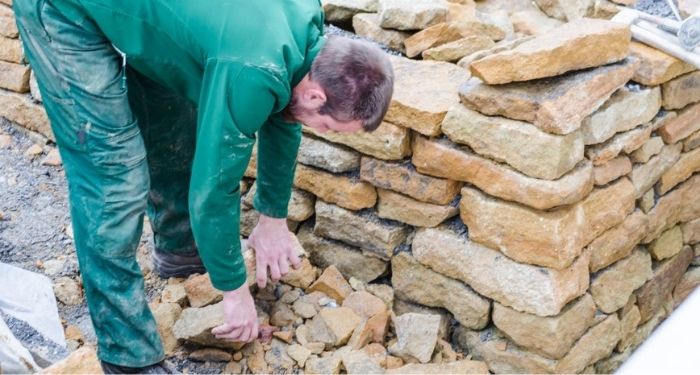
Alternatively, it may be to make way for the construction of a new house extension or even because there is land beyond your current wall that you have access to.
Depending on the size and type of wall, the garden wall removal cost alone will likely end up around £900 to £1,200.
FAQs
Q: How to render a wall garden?
A: There are various approaches to rendering a garden wall, but in general, you should use sand and cement. It is best to apply two coats of render.
The same can apply for a garden retaining wall, but again the best practice will depend on factors such as the wall materials.
Q: How do you build a garden wall blocks?
A: It will depend on the material, but many wall blocks can be created using shape configurations such as a stretcher or sash unit as a way to fill the necessary ingredients and begin building your garden wall blocks.
The exact process and ratio of ingredients will vary depending on the type of material being used.
Q: What is the strongest type of wall material?
A: Concrete is the strongest of conventional garden wall materials.
Q: How long does a garden wall last?
A: In most cases, a garden wall will stay firm for 50-100 years, though some can last well over a century if well-maintained.
Q: What is the best type of paint for a garden wall?
A: In general, it is ideal to use masonry paint, but it will depend on the wall material, among other factors.
Sources
- https://rismedia.com/2016/02/11/what-are-the-pros-and-cons-of-brick-homes/
- https://www.aboutcivil.org/bricks-advantages-disadvantages-uses.html
- https://www.ecooutdoorusa.com/learning-library/pros-cons-natural-stone-cladding/
- https://www.networx.com/article/concrete-retaining-wall-pros-and-cons
- https://www.fool.com/millionacres/real-estate-market/home-renovations/pros-and-cons-of-exposed-brick-walls/
- https://bloomington.floorcoveringsinternational.com/articles/pros-and-cons-of-slate-tile-flooring/

